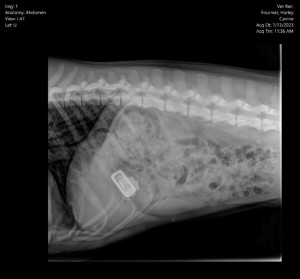Dog Swallows Fitbit That Continues to Track Her Movement
 Anyone who has ever raised a puppy knows that they like to swallow things. Sometimes strange things. So, when Marie Fournier went to retrieve her Fitbit from its charging cord in her bedroom and found it missing, it didn’t take long for her to suspect a suspect.
Anyone who has ever raised a puppy knows that they like to swallow things. Sometimes strange things. So, when Marie Fournier went to retrieve her Fitbit from its charging cord in her bedroom and found it missing, it didn’t take long for her to suspect a suspect.
“I had my Fitbit plugged in on my dresser upstairs,” said Fournier, who lives in Caseville, Mich. with her husband Norm and their two dogs, Harley and Halley. “I don’t use it every day, but I was confident I had left it in the bedroom. After a couple of days of looking for it, I opened the app and confirmed it must be around because someone was using it. It was hilarious. It had been tracking movement and it was like I rode my bicycle outside for 20 minutes.”
According to Fournier, the dogs don’t usually sleep with them upstairs and she thought she had puppy-proofed her home. Once she began to think it could be one of the dogs, however, she put her suspicions to the test.
“When I realized it must be one of the dogs who took the Fitbit, I began to suspect that perhaps Halley had eaten it because she was acting strangely,” Fournier explained. “I put Halley in the car with me and drove around the block, but the app wasn’t tracking. Then I did the same thing with Harley and found out she was the real culprit. Halley’s strange behavior must have been empathy for her sister.” At that point, Fournier knew she needed to call her veterinarian.
“At first, the veterinarian recommended we call another poison control center, but then I remembered that we have an AKC policy that includes calls to Pet Poison Helpline,” Fournier added. Pet Poison Helpline partners with AKC Reunite, the nation’s largest not-for-profit pet recovery service, offering its 24/7 toxicology expertise as an optional, unlimited benefit for its members to add to their pet’s lifetime protection. Fortunately, Fournier had opted in for the coverage, so her consultations were included.
“When I spoke with the wonderful folks at Pet Poison Helpline, I explained what had happened and they recommended I take Harley to the veterinarian immediately,” Fournier said. She then loaded Harley into the car and took her to Caseville Small Animal Clinic. When she arrived, the veterinary team did a radiograph that not only confirmed the Fitbit had been swallowed, but there was another mass that they couldn’t identify in her lower intestines. At first, they tried to induce vomiting. Nothing came up, but the mass moved, and we could see it better.”
“With any foreign body ingestion, there is a risk the item can become lodged in the stomach or intestines,” said Dr. Renee Schmid, a senior veterinary toxicologist at Pet Poison Helpline. “We were also concerned about the Fitbit’s lithium polymer batteries. Lithium batteries can be more dangerous than common alkaline batteries, as they generate electrical current that causes severe tissue damage and necrosis (tissue death) if lodged in the gastrointestinal tract. Since it was more than 24 hours since ingestion, there was a concern the Fitbit would not pass on its own and we recommended surgery.”
During surgery, the medical team found that Harley had not only ingested the Fitbit, including its silicon band, but she had also swallowed a rock the size of a prune. Since Harley was going to be under anesthesia for the surgery, the Fourniers decided to take advantage and had her spayed.
“The Fourniers were fortunate that Harley ate the Fitbit still attached to the band, rather than chewing and swallowing the battery separately,” Dr. Schmid added, “The band most likely helped Harley avoid lodging of the battery and the severe tissue damage that is often seen with lithium batteries.”
If a pet ingests any type of battery, including the most common lithium and alkaline dry cell batteries, severe damage to the gastrointestinal tract can occur and immediate veterinary care is recommended. Depending on the specific type of battery, whether it was punctured, and how much was ingested, treatment can vary from at home monitoring, starting medication to provide gastrointestinal protection, or potentially surgery. Lithium batteries, especially round, button-type batteries, tend to become lodged in the esophagus, creating even more concerns.
“It’s actually lucky that Harley ate the Fitbit,” suggested Fournier. “If she hadn’t, we wouldn’t have known about the rock, and it might have caused far more damage or death. Even after they removed the Fitbit from her stomach, it is still working. I recently purchased a new band, and the Fitbit itself continues to track. I’m keeping it out of reach now.”
“Apparently, Fitbits can also take a licking and keep on ticking,” Marie added.
Pet Poison Helpline created Toxin Tails to educate the veterinary community and pet lovers on the many types of poisoning dangers facing pets, both in and out of the home. All the pets highlighted in Toxin Tails have been successfully treated for the poisoning and fully recovered.
About Pet Poison Helpline
Pet Poison Helpline, your trusted source for toxicology and pet health advice in times of potential emergency, is available 24 hours, seven days a week for pet owners and veterinary professionals who require assistance treating a potentially poisoned pet. We are an independent, nationally recognized animal poison control center triple licensed by the Boards of Veterinary Medicine, Medicine and Pharmacy providing unmatched professional leadership and expertise. Our veterinarians and board-certified toxicologists provide treatment advice for poisoning cases of all species, including dogs, cats, birds, small mammals, large animals and exotic species. As the most cost-effective option for animal poison control care, Pet Poison Helpline’s fee of $85 per incident includes follow-up consultations for the duration of the case. Based in Minneapolis, Pet Poison Helpline is available in North America by calling 800-213-6680. Additional information can be found online at www.petpoisonhelpline.com.
Contact: Dr. Renee Schmid
Pet Poison Helpline
(952) 806-3803
RSchmid@petpoisonhelpline.com
SOURCE Pet Poison Helpline
Short URL: https://caninechronicle.com/?p=259028
Comments are closed












